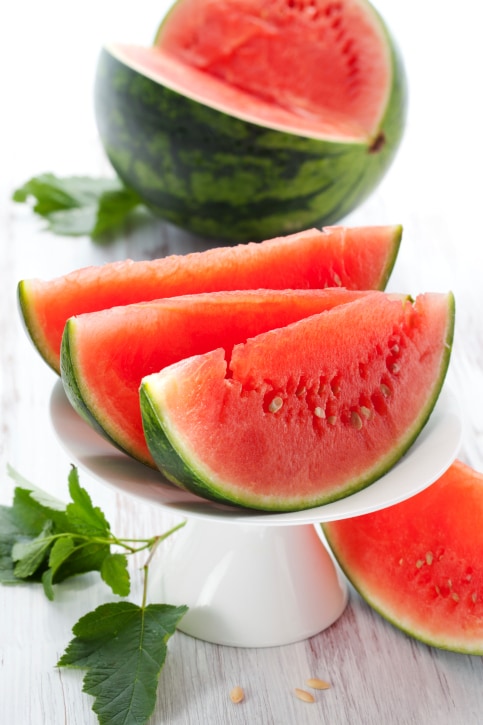
Hindi Name: Tarbooz
Belonging to the same family as cucumber, pumpkin and gourd, watermelon is actually a vegetable! It is, however, consumed as a fruit for it juicy flesh. Watermelon holds almost 92% water content and is considered an ideal health food.
The red or pink flesh is secured by thick green rinds that are either spotted or striped. Watermelon can be oblong or spherical in shape. The ideal size of a watermelon can vary from a few pounds up to 90 pounds.
Though the commonly found watermelon has a red or pink flesh, there are varieties that are red, orange, white or yellow. The colour of the flesh depends on the seeds and the hybrid.
Over past few years, seedless watermelons are raging in the market. There has been controversy questioning the quality of such melons.
Most common watermelon varieties are Jubilee, Royal Jubliee, Crimson sweet, Baby Doll and many more.
It is essential to choose a watermelon that is symmetrical in shape without any bruises and cuts.
Usage
Watermelon is one of the most refreshing summer-time fruit. Due to its high water content, it provides for a sumptuous meal, quenching your thirst and satisfying your hunger.
Watermelons are squeezed for their juice which is often served in most hotels as a welcome drink as it provides instant rejuvenation. Watermelons are commonly used in fruit salads. It is a perfect diet food as it is filling and non-fattening. Roasted watermelon seeds are widely consumed in Asia as a snack food. The rind of watermelon can be pickled and marinated as well.
Nutritional Value
1. Watermelon is considered the thirst quenching fruit owing to its water content.
2. The melon is rich in potassium that controls blood pressure and regulates heartbeat.
3. Juicy watermelons contain some of the best antioxidants in the nature.
4. Watermelon can also help improve sleep.
5. Watermelons play the role of a detergent in cleaning the kidneys.
6. Watermelons are a good source of vitamins A & C and potassium. They help lowering inflammation that contributes to conditions like asthma, atherosclerosis, diabetes and arthritis.
Did you know?
Watermelon was first harvested in Egypt almost 5,000 years ago.
In Vietnam, watermelon seeds are consumed on the Vietnamese New Year’s Day.
Watermelon is the symbol of Turkish city, Diyarbakir.
There are over 1,200 varieties of watermelons around the world.
[“source-ndtv”]










